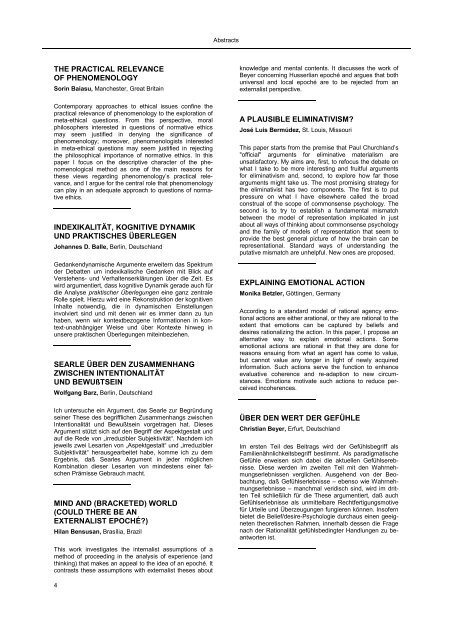Erfahrung und Analyse Experience and Analysis - Austrian Ludwig ...
Erfahrung und Analyse Experience and Analysis - Austrian Ludwig ...
Erfahrung und Analyse Experience and Analysis - Austrian Ludwig ...
Create successful ePaper yourself
Turn your PDF publications into a flip-book with our unique Google optimized e-Paper software.
THE PRACTICAL RELEVANCE<br />
OF PHENOMENOLOGY<br />
Sorin Baiasu, Manchester, Great Britain<br />
Contemporary approaches to ethical issues confine the<br />
practical relevance of phenomenology to the exploration of<br />
meta-ethical questions. From this perspective, moral<br />
philosophers interested in questions of normative ethics<br />
may seem justified in denying the significance of<br />
phenomenology; moreover, phenomenologists interested<br />
in meta-ethical questions may seem justified in rejecting<br />
the philosophical importance of normative ethics. In this<br />
paper I focus on the descriptive character of the phenomenological<br />
method as one of the main reasons for<br />
these views regarding phenomenology’s practical relevance,<br />
<strong>and</strong> I argue for the central role that phenomenology<br />
can play in an adequate approach to questions of normative<br />
ethics.<br />
INDEXIKALITÄT, KOGNITIVE DYNAMIK<br />
UND PRAKTISCHES ÜBERLEGEN<br />
Johannes D. Balle, Berlin, Deutschl<strong>and</strong><br />
Gedankendynamische Argumente erweitern das Spektrum<br />
der Debatten um indexikalische Gedanken mit Blick auf<br />
Verstehens- <strong>und</strong> Verhaltenserklärungen über die Zeit. Es<br />
wird argumentiert, dass kognitive Dynamik gerade auch für<br />
die <strong>Analyse</strong> praktischer Überlegungen eine ganz zentrale<br />
Rolle spielt. Hierzu wird eine Rekonstruktion der kognitiven<br />
Inhalte notwendig, die in dynamischen Einstellungen<br />
involviert sind <strong>und</strong> mit denen wir es immer dann zu tun<br />
haben, wenn wir kontextbezogene Informationen in kontext-unabhängiger<br />
Weise <strong>und</strong> über Kontexte hinweg in<br />
unsere praktischen Überlegungen miteinbeziehen.<br />
SEARLE ÜBER DEN ZUSAMMENHANG<br />
ZWISCHEN INTENTIONALITÄT<br />
UND BEWUßTSEIN<br />
Wolfgang Barz, Berlin, Deutschl<strong>and</strong><br />
Ich untersuche ein Argument, das Searle zur Begründung<br />
seiner These des begrifflichen Zusammenhangs zwischen<br />
Intentionalität <strong>und</strong> Bewußtsein vorgetragen hat. Dieses<br />
Argument stützt sich auf den Begriff der Aspektgestalt <strong>und</strong><br />
auf die Rede von „irreduzibler Subjektivität“. Nachdem ich<br />
jeweils zwei Lesarten von „Aspektgestalt“ <strong>und</strong> „irreduzibler<br />
Subjektivität“ herausgearbeitet habe, komme ich zu dem<br />
Ergebnis, daß Searles Argument in jeder möglichen<br />
Kombination dieser Lesarten von mindestens einer falschen<br />
Prämisse Gebrauch macht.<br />
MIND AND (BRACKETED) WORLD<br />
(COULD THERE BE AN<br />
EXTERNALIST EPOCHÉ?)<br />
Hilan Bensusan, Brasília, Brazil<br />
This work investigates the internalist assumptions of a<br />
method of proceeding in the analysis of experience (<strong>and</strong><br />
thinking) that makes an appeal to the idea of an epoché. It<br />
contrasts these assumptions with externalist theses about<br />
4<br />
Abstracts<br />
knowledge <strong>and</strong> mental contents. It discusses the work of<br />
Beyer concerning Husserlian epoché <strong>and</strong> argues that both<br />
universal <strong>and</strong> local epoché are to be rejected from an<br />
externalist perspective.<br />
A PLAUSIBLE ELIMINATIVISM?<br />
José Luis Bermúdez, St. Louis, Missouri<br />
This paper starts from the premise that Paul Churchl<strong>and</strong>’s<br />
"official" arguments for eliminative materialism are<br />
unsatisfactory. My aims are, first, to refocus the debate on<br />
what I take to be more interesting <strong>and</strong> fruitful arguments<br />
for eliminativism <strong>and</strong>, second, to explore how far those<br />
arguments might take us. The most promising strategy for<br />
the eliminativist has two components. The first is to put<br />
pressure on what I have elsewhere called the broad<br />
construal of the scope of commonsense psychology. The<br />
second is to try to establish a f<strong>und</strong>amental mismatch<br />
between the model of representation implicated in just<br />
about all ways of thinking about commonsense psychology<br />
<strong>and</strong> the family of models of representation that seem to<br />
provide the best general picture of how the brain can be<br />
representational. St<strong>and</strong>ard ways of <strong>und</strong>erst<strong>and</strong>ing the<br />
putative mismatch are unhelpful. New ones are proposed.<br />
EXPLAINING EMOTIONAL ACTION<br />
Monika Betzler, Göttingen, Germany<br />
According to a st<strong>and</strong>ard model of rational agency emotional<br />
actions are either arational, or they are rational to the<br />
extent that emotions can be captured by beliefs <strong>and</strong><br />
desires rationalizing the action. In this paper, I propose an<br />
alternative way to explain emotional actions. Some<br />
emotional actions are rational in that they are done for<br />
reasons ensuing from what an agent has come to value,<br />
but cannot value any longer in light of newly acquired<br />
information. Such actions serve the function to enhance<br />
evaluative coherence <strong>and</strong> re-adaption to new circumstances.<br />
Emotions motivate such actions to reduce perceived<br />
incoherences.<br />
ÜBER DEN WERT DER GEFÜHLE<br />
Christian Beyer, Erfurt, Deutschl<strong>and</strong><br />
Im ersten Teil des Beitrags wird der Gefühlsbegriff als<br />
Familienähnlichkeitsbegriff bestimmt. Als paradigmatische<br />
Gefühle erweisen sich dabei die aktuellen Gefühlserebnisse.<br />
Diese werden im zweiten Teil mit den Wahrnehmungserlebnissen<br />
verglichen. Ausgehend von der Beobachtung,<br />
daß Gefühlserlebnisse – ebenso wie Wahrnehmungserlebnisse<br />
– manchmal veridisch sind, wird im dritten<br />
Teil schließlich für die These argumentiert, daß auch<br />
Gefühlserlebnisse als unmittelbare Rechtfertigungsmotive<br />
für Urteile <strong>und</strong> Überzeugungen fungieren können. Insofern<br />
bietet die Belief/desire-Psychologie durchaus einen geeigneten<br />
theoretischen Rahmen, innerhalb dessen die Frage<br />
nach der Rationalität gefühlsbedingter H<strong>and</strong>lungen zu beantworten<br />
ist.












